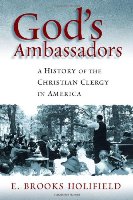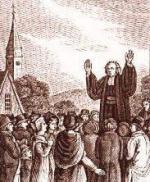
In The Prince Niccolo Machiavelli writes, “For men almost always follow in the footsteps of others, imitation being a leading principle of human behaviour. Since it is not always possible to follow in the footsteps of others, or to equal the ability of those whom you imitate, a shrewd man will always follow the methods of remarkable men, and imitate those who are outstanding, so that, even if he does not succeed in matching their ability, at least he will get in sniffing distance of it.” Beyond the gender bias of his words, and the potentially pungent smell of one’s role model [remember, Machiavelli is writing in 1532 so “sniffing distance” is more than just romantic imagery!], Machiavelli makes a sound observation: investigating the methods of remarkable figures and seeking to imitate them is an effective way for increasing the success of one’s endeavors.

By means of a book review, Dr. James P. Wind calls attention to the 2007 text God’s Ambassadors: A History of the Christian Clergy in America written by E. Brooks Holifield of Emory University. In this text, Holifield “made a pioneering attempt to shape the complex, contradictory, and largely unknown experience of America’s ministers, priests, and pastors into a single narrative,” writes Wind. For those who are ministers, pastors, priests, lay leaders, organizational leaders, etc., God’s Ambassadors may prove to be a gold mine for discovering the “methods of remarkable” people.
According to Wind’s summary, God’s Ambassadors draws a striking picture of 18th century American clergy. As the intellectual elite of the period, the clergy were the best-selling authors of the time. As their “printed sermons, books, and tracts” were flying off the shelves, so too were their voices being consumed at a rapid pace. Wind recounts that the average congregant heard 7,000 sermons in her/his lifetime. Not only did these 18th century elites write and preach, but they also founded universities. Prior to the Civil War, “clergy had founded most of America’s antebellum colleges and 90% (262 of 288) of college presidents were ministers.”
As American culture became more “learned and secular” the role of clergy shifted away from intellectual leadership into the realm of “benevolent organizations.” By forming and leading these new organizations, ministers sought to alleviate the social needs of the nation.
Just as America’s population, ideology, and socio-economic conditions have been diverse throughout its history, so too has diversity manifest in the working context of America’s ministers. Some ministers launched and managed multidimensional organizations and programs serving thousands of people and drawing handsome salaries while the majority of America’s ministers labored under harsher conditions. As Wind reports, “Most worked alone and struggled to make a living (some taking their wages in bales of tobacco or other crops, others supporting themselves as farmers or laborers).”

Amidst the diversity, Holifield was able to identify some key commonalities. The first commonality that Holifield developed involves the role of authority. He noted that authority was and is ambiguous in the American context. Did a minister’s authority derive from her/his ecclesiastical confirmation, from his/her “personal charisma or an inner call from God,” or from her/his specialized knowledge and skills? For Holifield, the American context tested all three sources and continues to do so.
The second common element is the responsibilities that American ministers have and continue to perform. Drawing a list of such duties, Holifield included: “preaching, baptizing, serving the bread and wine (or grape juice), teaching, administering, organizing, raising money, helping the poor, instructing children, visiting, marrying and burying, and counseling with heartbroken parents and bewildered adolescents and people seeking one or another kind of salvation.” The steadfast fulfillment of these trying and multifarious responsibilities by American ministers has help contribute to the stability of American culture.
Throughout America’s history, ministers have sought to engage and respond to the needs of their congregants and the broader society. Wind captures this dynamism beautifully in the following lines: “Ministers explored their worlds – whether the geographical frontiers of America, the depths of their sacred texts and traditions, or the lives of the people they served. They worked to understand what was really going on in their environments, in their members’ daily lives and in the great events that shaped the nation. They were willing to change, sometimes with small liturgical changes or subtle theological shifts in emphasis and other times with large social actions. They responded with faithful acts of pastoral care and religious leadership and with innovations that set many of the contours for subsequent American life. Above all, they embodied hope. Week after week, sermon after sermon, they reminded succeeding generations of congregation members that they were not alone or forgotten, that they were, in fact, part of the people of God” (Emphasis in the original).
God’s Ambassadors may be a rich resource for those seeking to understand the history of ministers in America and for clergy seeking means to enhance their ministries. From Wind’s description of Holifield’s work, there seems to be little doubt that God’s Ambassadors is replete with historical examples that may spark new ideas, engender new endeavors, and invite the rejuvenation of former programs. God’s Ambassadors may be a gateway for following Machiavelli’s advice, that is, for identifying role models and investigating their methods. For those eager to expand their horizons, Holifield’s book may help one get within “sniffing distance”of the sweet smell of one’s goals and dreams.
* Page 19 of Niccolo Machiavelli’s The Prince. Edited by Quentin Skinner and Russell Price. Cambridge: Cambridge University Press. 1988.
Links
To read James P. Wind’s full review of God’s Ambassadors: A History of the Christian Clergy in America click here.


